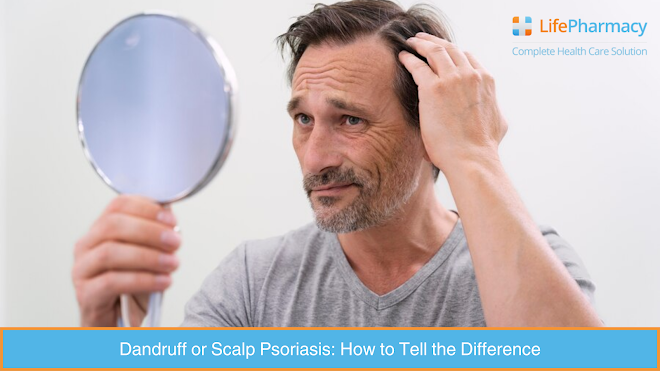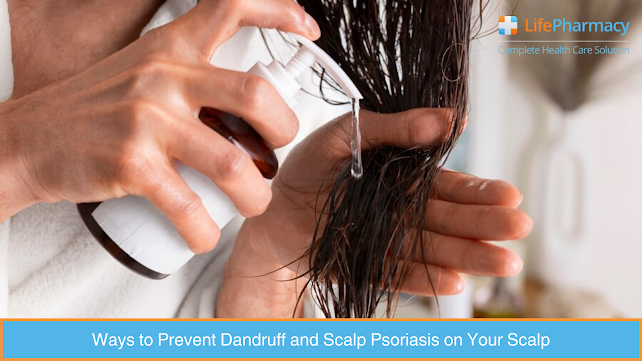Millions of individuals worldwide suffer from the common ailment known as dandruff. Dandruff is often characterized by small, white, or grayish flakes on the scalp and hair, which can be unsightly and sometimes itchy. However, these symptoms can sometimes overlap with another scalp condition called "Scalp Psoriasis."
Although both disorders have overt peeling symptoms, their underlying causes and suggested treatments vary. The underlying causes, therapies, and management strategies of dandruff and scalp psoriasis differ greatly. By understanding the causes and symptoms of dandruff and scalp psoriasis, you can make a more informed decision about effectively addressing each condition.
This article will examine the important distinctions between scalp psoriasis and dandruff to help readers correctly diagnose their symptoms and find the best treatments for lasting relief.
Related Posts: WHAT IS SCALP PSORIASIS AND HOW DO YOU TREAT IT?
What Is Dandruff?
Dandruff, a prevalent scalp condition, is characterized by the shedding of small, dry skin flakes from the scalp. While these noticeable flakes can cause embarrassment when they land on the shoulders, it's important to note that dandruff is neither contagious nor detrimental to one's overall health. It's important to remember that what first seems to be dandruff may be a sign of a skin condition, such as seborrheic dermatitis, eczema, psoriasis, or fungal infection.
What Is Scalp Psoriasis?
Scalp psoriasis, a condition that can affect the scalp and other areas of the body, is characterized by the presence of red, scaly patches of skin. The similarity between the flakes produced by scalp psoriasis and dandruff often leads to confusion. Since the patches of affected skin are often covered by hair, individuals may mistakenly perceive it as a mere dandruff episode. However, it is crucial to recognize that scalp psoriasis is a more serious issue stemming from an autoimmune disorder. Unlike dandruff, scalp psoriasis is a chronic condition that can periodically flare up, requiring specific attention and management.
What’s the Difference: Scalp Psoriasis vs. Dandruff
1. Causes
Dandruff is often caused by excessive oil production in the scalp, certain hair care products, fungal infections, lack of hygiene, hormonal changes, or impaired immune systems.
On the other hand, scalp psoriasis is largely an autoimmune genetically driven condition. It happens when the immune system overreacts and destroys healthy skin cells, which causes an accumulation of dead skin cells in the form of white scales or flakes.
2. Symptoms
Both dandruff and scalp psoriasis can result in an itchy scalp and white flakes. However, there are some distinguishing factors:
Dandruff flakes may be accompanied by greasy and oily hair.
Scalp psoriasis flakes tend to be more scaly or powdery, and the condition can cause scalp pain.
Psoriasis can also manifest as red, scaly patches on the elbows, knees, skin around the ears, and the back of the neck, extending beyond the scalp.
3. Diagnosis
Diagnosis for both conditions typically involves a physical examination of the scalp and head by a doctor or dermatologist.
Dermatologists may conduct further tests, such as taking a skin sample for laboratory analysis, especially if scalp psoriasis is suspected. Red, purple, or brown patches beneath the hair can indicate psoriasis.
4. Treatment
Dandruff can often be managed at home using over-the-counter medications or by adjusting hair care products.
Scalp psoriasis, a chronic condition without a cure, requires ongoing treatment to manage symptoms and prevent flare-ups. Medical interventions may include topical medications, systemic treatments, phototherapy, or lifestyle modifications.
If you have ongoing symptoms of either ailment, seeing a doctor for a precise diagnosis and individualized treatment plan is critical. Understanding the differences between scalp psoriasis and dandruff can help individuals seek appropriate care and effectively manage their hair loss and scalp health.
How Dandruff Arises
Regarding scalp issues, dandruff is a common complaint that can be particularly frustrating. Dry skin flakes frequently fall on the shoulders of those with this problem, which is uncomfortable and embarrassing. Dandruff typically occurs due to the body'sDandruff is a common scalp condition that often results in visible flakes of dry skin on the scalp, which may also fall onto the shoulders.
It is typically caused by an exaggerated body response to the presence of yeast on the skin, leading to inflammation and excessive production of skin cells. Usually modest in size, the resulting flakes may also be accompanied by dry skin on other body areas. While dandruff can also be triggered by harsh shampoos or the use of excessive hair chemicals, a prevalent cause of dandruff is a condition known as seborrheic dermatitis.
Online pharmacy experts regard seborrheic dermatitis as a form of eczema that affects areas of the skin with sebaceous glands producing oil. This condition is characterized by patches of red and oily skin, which lead to larger, yellowish flakes on the scalp compared to those caused by dry skin.
How Psoriasis Arises
When it comes to skin and hair care, understanding the root cause of any issues can be crucial. Dandruff, a common condition marked by dry skin flakes on the scalp, often occurs due to an overreaction to yeast on the skin or harsh shampoos and chemicals.
In contrast to dandruff, Psoriasis is an autoimmune illness that manifests as dry, flaky patches on the back, elbows, knees, and scalp due to antibodies attacking healthy tissue. This condition speeds up skin cell turnover in many body parts, accumulating dead skin cells on the surface and calling for regular skin and hair care. Seeking effective treatments and using appropriate skin and hair care products can help manage Psoriasis and alleviate uncomfortable symptoms.
Ways to Prevent Dandruff and Scalp Psoriasis on Your Scalp
Preventing Dandruff
Use dandruff shampoo regularly. Incorporating a dandruff shampoo into your hair care routine can help prevent the formation of dandruff.
Keep your hair clean. Regularly washing your hair. 2 to 3 times a week can prevent the buildup of oil and dirt on your scalp, contributing to dandruff.
Brush your hair away from the scalp. Brushing your hair away from the scalp helps prevent oil from accumulating on your scalp, reducing the risk of dandruff.
Preventing Scalp Psoriasis
While it's not possible to completely prevent scalp psoriasis, certain measures can help manage and reduce flare-ups:
Keeping your scalp moisturized can help alleviate dryness and reduce the risk of flare-ups. Use a gentle, fragrance-free moisturizer or emollient specifically formulated for the scalp to maintain hydration.
Regularly shampoo your hair and scalp to remove excess oil, dead skin cells, and potential irritants.
Cover your head with a hat or scarf to protect your scalp from potential triggers when exposed to harsh weather conditions like cold or dry air.
The Bottom Line
It's essential to distinguish between dandruff and scalp psoriasis to receive correct and effective treatment. Dandruff is usually due to the body's overreaction to yeast on the skin or harsh hair care products, leading to the overproduction of skin cells. On the other hand, scalp psoriasis is an autoimmune disease that accelerates skin cell turnover and affects various body areas, including the scalp.
If you're dealing with persistent skin flakes on your scalp, it's important to seek professional medical advice and consider purchasing appropriate hair care products from a trusted online chemist. A trustworthy online pharmacy can offer professional advice and budget-friendly treatment solutions to help you manage your symptoms and improve your general well-being.


Comments
Post a Comment